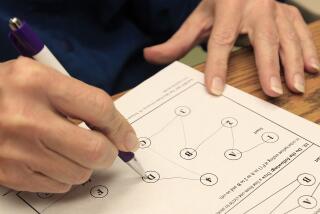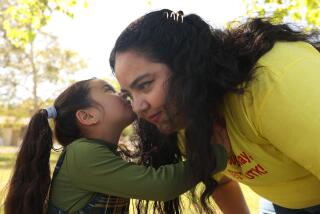The IQ Question
- Share via
Trick Question: Should parents administer at-home IQ tests to their kids?
Pick one: a) Yes; b) No; or c) Maybe, but don’t make me take one myself.
For parents hoping their kids will be able to fork out for their own educations from their “Jeopardy” winnings, here’s news. Virtual Knowledge, a Needham, Mass.-based software company, has begun offering what it says is the first CD-ROM aptitude and IQ test for children.
Available in two versions, one for kindergarten to third grade and another for grades four to six, “The Children’s IQ and Achievement Test” uses animation and sound effects in a series of tests designed to quantify a child’s academic strengths and weaknesses as well as provide an IQ ranking. A third version for children in grades seven to nine is on its way to computer stores this month.
Guided by Stripes the Skunk, test-takers are invited to explore “Brainville,” a small town made up of various houses and clickable objects. Each house in Brainville is inhabited by a different character designed to help the child through the test-taking process.
All three age levels get three test sections: an aptitude test that can include listening comprehension, symbolic reasoning and analogies, which produces the IQ score; an achievement section of mathematics, vocabulary, reading comprehension, spelling and usage; and a games section to sharpen skills.
The test was designed by PRO-ED, an Austin, Texas-based company that specializes in developing traditional paper and pencil tests for educators and psychologists. According to Virtual Knowledge President David Blohm, PRO-ED administered sample tests to more than 10,000 children who represented a cross-section of socioeconomic groups to arrive at its average score. The test does not score above 130 or below 70 and the average score is 90 to 110.
While some education experts question the advisability of at-home IQ testing when intelligence testing as a whole remains controversial, the software manufacturer maintains that the product is an important tool for parents to help identify and track a child’s needs and talents.
“The test is a way to help parents keep in touch with how their kids are doing,” Blohm says. “For example, one woman who bought our product had just moved with her family to a new city where her son was placed in a combined fourth- and fifth-grade class of 106 students. Our product offered her an important way to track his progress in that difficult learning situation.”
Katie Spinos, assistant superintendent for the Newton, Mass. Public School District and an advisory board member for Virtual Knowledge, says that such a product when used properly can be useful. “Parents are always asking for additional information on how their kids stand academically,” Spinos says. “By parents sharing the test results with the child’s teachers, everyone can work together to help focus the kid’s learning--challenging the strengths and concentrating on areas where he or she needs extra help.”
Not surprisingly, some psychologists and educators are raising questions as to the wisdom of do-it-yourself IQ testing.
“Although I haven’t seen this particular product, overall, this kind of intelligence testing gives people like me the shakes,” says Eva Baker, acting dean of the graduate school of education and information studies at UCLA and co-chair of the Joint Committee on Technical Standards for Educational and Psychological Testing.
“For one reason, very small variations in administering the test can result in very large variations in scores,” Baker says. “All it takes is for a well-meaning parent to grimace when a kid gets an answer wrong. If the child sees that brief facial expression, it can change the way he or she answers the next question.
“Moreover, in any test, results concerning younger children tend to be unreliable, so I worry about people making judgments or decisions based on these results,” she says.
“I’m also concerned about people trying to measure the child in order to fulfill their own needs. It can also be damaging if parents aren’t prepared with how to deal with children who do not do well on the test.”
She adds, “I’m for parents independently verifying what teachers are telling them about their kids’ achievement level providing the test is good, the child is assessed at the right level and the parent is reasonably well trained on how to give the test. The IQ portion is what concerns me.”
“My kids think it’s fun,” says Valerie Herman, a Newton mother of three, ages 6, 8 and 10, of the test. “My oldest has taken the IQ test. The other two just play the games. I didn’t expect to find anything earthshaking in the results and, in fact, I didn’t. It’s like many of the other educational games my kids play only this gives feedback at the end.”
The key, Herman says, is not to take the test too seriously. “I know a lot of very smart people who can’t even open a door, so I’m not taking the IQ portion of this to heart. If you’re really agonizing over whether to have your kid take the test you’re probably doing it for the wrong reasons. For us, it’s just another game in the house, and in this age of Beavis and Butt-head, if it’s fun and the kids can learn from it, it’s good.”
Herman admits, however, that when she sat down to take Virtual Knowledge’s adult version of the IQ test, it was more difficult to maintain such a carefree attitude about her own results. “I did pretty well,” she says, sounding a little relieved.
Regarding concerns raised by experts like Baker about the IQ test, Herman says she’ll continue to let her kids play with the CD-ROM test on the computer. “It’s better than them playing Doom,” she says.






